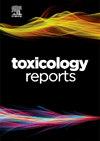库美司铎诱导人肝癌细胞凋亡并抑制其侵袭
Q1 Environmental Science
引用次数: 0
摘要
肝细胞癌(HCC)是一个主要的公共卫生问题,晚期患者预后较差。本实验旨在研究库米特罗对人肝癌HepG2细胞的细胞毒活性。采用结晶紫(CV)法评价Vero细胞(正常肾)和HepG2细胞的细胞毒性。Annexin V/FITC染色分析细胞凋亡。采用实时荧光定量PCR (qPCR)检测BAX、bcl-2、NF-Kβ、PCNA、MMP2、Caspase-3、Caspase-9、COX2、MMP9的相对表达量。建立Bax和PCNA的免疫组化分析(IHC)。结果表明,库美特罗对HepG2细胞有明显的毒性作用。Annexin V-FITC染色结果显示,古美司罗诱导的HepG2细胞毒性是通过细胞凋亡刺激介导的。HepG2细胞凋亡是通过caspase激活介导的。coumestrol通过抑制MMP-2和MMP-9的表达来抑制HepG2细胞的侵袭。免疫组化证实了Bax的强表达和PCNA的核表达。据我们所知,有限的研究调查了古美特罗的影响。研究表明,库美醇对HepG2细胞具有细胞毒性和凋亡作用,同时抑制侵袭相关基因的表达。本文章由计算机程序翻译,如有差异,请以英文原文为准。
Coumestrol induces apoptosis and inhibits invasion in human liver cancer cells
Hepatocellular carcinoma (HCC) is a major public health problem, with a poor prognosis in patients with advanced disease. We aimed to investigate the cytotoxic activity of coumestrol against human hepatocellular carcinoma HepG2 cells. Crystal violet (CV) assay was performed for cell cytotoxicity assessment on Vero cells (normal Kidney) and HepG2 cells. Apoptosis was analyzed by Annexin V/FITC staining. The relative expression of BAX, bcl-2, NF-Kβ, PCNA, MMP2, Caspase-3, Caspase-9, COX2, and MMP9 was detected using quantitative real-time PCR (qPCR). In addition, immunohistochemical analysis (IHC) of Bax, and PCNA were established. Results indicated that coumestrol induced significant toxicity in HepG2 cells. Annexin V-FITC staining assays revealed that coumestrol-induced cytotoxicity in HepG2 cells was mediated through apoptosis stimulation. The apoptosis in HepG2 cells was mediated through caspase-activation. Cell invasion was inhibited by coumestrol in HepG2 cells via inhibition of MMP-2 and MMP-9 expressions. IHC confirmed the strong expression of Bax and nuclear expression of PCNA in treated cells. To the best of our knowledge, limited studies have investigated the impact of coumestrol. The study showed that coumestrol exhibited cytotoxic and apoptotic effects against HepG2 cells, accompanied by inhibition of invasion-related gene expression.
求助全文
通过发布文献求助,成功后即可免费获取论文全文。
去求助
来源期刊

Toxicology Reports
Environmental Science-Health, Toxicology and Mutagenesis
CiteScore
7.60
自引率
0.00%
发文量
228
审稿时长
11 weeks
 求助内容:
求助内容: 应助结果提醒方式:
应助结果提醒方式:


